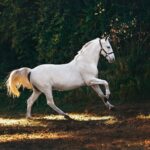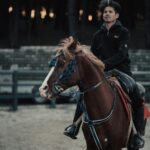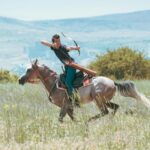Horses, with their majestic presence and soulful eyes, have captivated human hearts for millennia. Yet beyond their utility as working animals or competitive athletes, many horse breeds possess remarkably playful temperaments that make them extraordinary companions. These social equines often seek out human interaction, displaying curiosity, intelligence, and sometimes even mischievous behaviors that endear them to their handlers. Whether you’re an experienced equestrian or considering your first horse, understanding which breeds tend toward playfulness can help match you with a four-legged friend whose personality complements your own. From the animated antics of ponies to the gentle giants who love a good game, let’s explore the horse breeds most renowned for their playful spirits and desire for human connection.
American Quarter Horse: The Versatile Playmate

American Quarter Horses consistently rank among the most interactive and personable equine breeds, combining intelligence with an eagerness to engage with their human handlers. Their balanced temperament strikes the perfect note between energetic playfulness and reliable steadiness, making them approachable for handlers of various experience levels. These horses often display their playful nature through body language like nudging, following their owners around pastures, and showing genuine curiosity about activities happening around them. Their problem-solving abilities and quick learning make training sessions feel more like play than work, with many Quarter Horses actively seeking out challenges and novel experiences.
Morgan Horse: The Friendly Extrovert

Morgan horses carry a well-deserved reputation as one of the most people-oriented breeds, often described as “wearing their hearts on their sleeves” due to their expressive nature. These intelligent equines form deep bonds with their handlers and frequently demonstrate their playfulness through animated movements, attentive ears, and an almost dog-like eagerness to please. Morgans typically maintain their youthful exuberance well into their adult years, often inventing games in turnout and showing genuine excitement when their favorite people arrive. Their natural curiosity and social intelligence make them particularly responsive to positive reinforcement training methods, turning learning sessions into enjoyable bonding experiences for both horse and handler.
Arabian Horse: The Spirited Companion

The Arabian’s legendary sensitivity and expressiveness make them among the most interactive breeds, with personalities as striking as their distinctive physical features. Their alertness and energy translate into playful behaviors that showcase their intelligence and desire for mental stimulation beyond basic care and riding. Arabians typically form intense bonds with their handlers, demonstrating their affection through playful nuzzling, following trusted humans, and displaying visible excitement when their favorite people approach. Their natural athleticism and enthusiasm lend themselves to various games and exercises that engage both mind and body, from ground-based liberty work to mounted activities that challenge their problem-solving abilities.
Shetland Pony: The Pint-Sized Prankster

Despite their small stature, Shetland ponies pack outsized personalities that have earned them a reputation as the comedians of the equine world. These hardy little equines often display mischievous tendencies, from untying knots and opening gates to inventing creative ways to reach treats they shouldn’t have. Their natural intelligence combined with a stubborn streak means they require consistent, positive handling to channel their playfulness into appropriate behaviors rather than troublesome antics. Many Shetland owners report their ponies developing elaborate games, seeking out human attention, and displaying a particular fondness for children with whom they often form special bonds.
Welsh Pony: The Energetic Entertainer

Welsh ponies combine intelligence, athleticism, and a zest for life that makes them extraordinarily interactive companions for those who appreciate their spirited nature. Their playful tendencies manifest in various ways, from expressive facial movements to animated gaits when excited about an upcoming activity or the arrival of a familiar person. These ponies often display remarkable problem-solving abilities, figuring out puzzles and challenges with an enthusiasm that makes training sessions feel more like play. Their natural curiosity and desire for stimulation make them excellent candidates for activities beyond traditional riding, including agility exercises, liberty work, and trick training that showcases their cleverness.
Appaloosa: The Engaging Spotted Wonder

Appaloosas combine the Native American heritage of intelligence and versatility with a distinctly people-oriented temperament that makes them delightful interactive partners. Their natural curiosity and alert nature translate into playful behaviors like investigating new objects, responding enthusiastically to training challenges, and showing genuine interest in human activities around them. Many Appaloosa owners describe their horses as having distinct senses of humor, sometimes playing gentle pranks or creating games that showcase their cleverness and desire for engagement. Their historical background as all-around horses for Native American tribes imbued them with adaptability and an eagerness to please that makes them responsive to creative training approaches.
Miniature Horse: The Pocket-Sized Playmate

Miniature horses pack remarkably big personalities into their tiny frames, often displaying levels of playfulness and interaction more commonly associated with dogs than horses. Their natural curiosity and intelligence frequently manifest in behaviors like following their humans around, inventing games, and showing extraordinary problem-solving abilities that sometimes lead to amusing mischief. Many miniature horse owners report their equines learning to perform tricks voluntarily, seeking out attention through charming behaviors, and displaying clear preferences for certain games or activities. Their diminutive size makes them less intimidating for newcomers to horses, while their interactive nature provides many of the same relationship benefits as their larger counterparts.
Haflinger: The Golden Jester

Haflingers combine their striking golden appearance with equally golden temperaments that blend reliability with a delightful sense of play. These Austrian-origin horses are known for their expressive faces, with many owners describing how their Haflingers communicate desires and moods through elaborate ear movements, nostril flares, and facial expressions that almost seem human in their clarity. Their playfulness often shows through in their natural curiosity about objects, people, and other animals, frequently investigating new things with gentle lips and attentive eyes. Haflingers typically maintain their youthful playfulness well into adulthood, with many enjoying interactive games like fetch, follow-the-leader, and liberty exercises where they can showcase their intelligence.
Paint Horse: The Colorful Character

American Paint Horses combine their eye-catching coat patterns with equally striking personalities that blend intelligence, athleticism, and a genuine affinity for human interaction. Their Quarter Horse heritage contributes to their people-oriented nature, with many Paints demonstrating remarkable awareness of their handlers’ emotions and responding with appropriate playfulness or gentleness as the situation requires. These horses often show their playful side through animated movement when excited, gentle nuzzling for attention, and visible enthusiasm for interactive training sessions that challenge their minds. Many Paint owners report their horses inventing games during turnout, seeking out favorite people in a crowd, and displaying clear preferences for certain activities that allow them to engage both physically and mentally.
Icelandic Horse: The Playful Viking

Icelandic horses may be small in stature but possess outsized personalities characterized by intelligence, confidence, and a distinctive playfulness that endears them to handlers. Their unique gait known as the tölt often becomes an expression of their exuberance and joy, with many Icelandics breaking into this animated movement when excited about interaction or play. These hardy horses typically maintain their playful nature throughout their exceptionally long lifespans, with many remaining interactive and youthful well into their 20s and even 30s. Their natural curiosity and problem-solving abilities make them responsive to creative training approaches that incorporate games, liberty work, and positive reinforcement techniques.
Norwegian Fjord: The Gentle Giant Jokester

Norwegian Fjords combine their distinctive appearance with equally distinctive personalities that blend steadiness with a surprising capacity for playfulness and humor. Their expressive faces, with those characteristic “smiling” lips and attentive eyes, often reflect their engaging personalities and genuine interest in human interaction. Many Fjord owners report their horses displaying dog-like behaviors, following them around pastures, responding to names, and showing visible excitement when favorite people appear. Despite their sturdy build, Fjords frequently demonstrate remarkable agility in play, executing playful bucks, spins, and even purposeful “dancing” movements that showcase both their athletic ability and their joyful nature.
Nurturing Playfulness: Creating Enrichment for Interactive Breeds

Providing appropriate outlets for play and interaction remains essential for these naturally gregarious breeds to thrive both mentally and emotionally. Environmental enrichment through varied turnout spaces, equine-safe toys, and regular introduction of novel objects helps satisfy their curiosity and prevents boredom-related behaviors. Training approaches that incorporate games, positive reinforcement, and varied activities typically resonate with these breeds far better than repetitive drill-type exercises. Building regular unstructured interaction time into care routines—simply being present with these horses without specific demands—allows their unique personalities to emerge and strengthens the human-equine bond. Remember that playful behavior should always be channeled appropriately, with consistent boundaries that prevent potentially dangerous behaviors while still honoring the horse’s natural exuberance.
Choosing Your Perfect Playful Partner

When selecting a playful equine companion, consider not only the breed tendencies but also individual temperament, as personality variation exists within every breed. Take time to interact with any prospective horse multiple times, observing how they respond to various stimuli, their curiosity level, and their willingness to engage with humans outside of work contexts. An honest assessment of your own experience level, facilities, and time commitment remains crucial, as more interactive breeds often require additional mental stimulation and engagement to prevent boredom. Remember that the most rewarding partnerships develop when the horse’s natural tendencies align with the owner’s expectations, lifestyle, and handling abilities. The joy of partnering with a naturally playful and interactive horse lies in the genuine relationship that develops—one based on mutual trust, respect, and the shared pleasure of each other’s company.
Conclusion

The world of playful horse breeds offers something for everyone, from the mischievous antics of ponies to the gentle humor of larger breeds. These interactive equines remind us that horses are far more than utilitarian animals or competitive partners—they are thinking, feeling beings capable of genuine connection and joy. By understanding and appreciating their playful nature, we open ourselves to a deeper relationship with these magnificent creatures, one based not merely on what they can do for us, but on the mutual delight of shared experiences. Whether you’re drawn to the spirited Arabian, the steady Quarter Horse, or the comical Shetland, embracing your horse’s natural playfulness can transform routine care and training into a journey of discovery, laughter, and lasting friendship.







